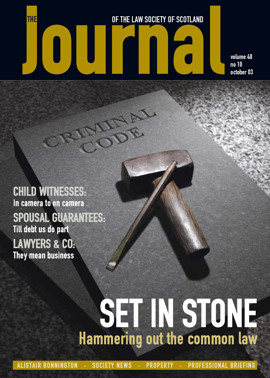Housing Improvement Task Force
As many of you will be aware from previous Journal articles, the Executive’s Housing Improvement Task Force produced a report in 2003. The section which affects solicitors is in relation to improving the operation of the housing market. The Executive’s review of the housing market and in particular the process of buying and selling homes focused on the quality of information available to buyers. The Executive took the view that improving the information available to house buyers and sellers could mark a significant improvement in the operation of the market and improve services to those concerned. Their aim is to build on the strength of the existing house buying and selling system and in particular its ability to deliver clear outcomes in a relatively short time.
There are two key areas where the Executive believe that buyers and sellers need to be better informed: in respect of the condition of properties as they go to market and the nature and extent of any common or shared maintenance and repairing obligations. Their two key recommendations are, first, that there should be a single survey, initially commissioned by the seller but made available to all potential purchasers and paid for by the ultimate buyer. The survey will be carried out by a suitably qualified valuation surveyor and would include a valuation, good quality information on the condition of the house, its accessibility and the extent to which it is energy efficient. They envisage that a style of contract should be developed to ensure that contractual liability of the surveyor transfers to the eventual purchaser and any lender. Linked to this proposal are recommendations intended to ensure that arrangements for commissioning surveys, the relationships between the various professionals involved and the likely costs of the process are properly transparent.
They also recommend that sellers’ agents should provide a purchaser’s information pack which would include copies of any planning, listed building consents and building warrants relative to the property, any guarantees of work carried out and any details of common repair and maintenance burdens attached to flatted properties and relative property management arrangements. These proposed changes should be piloted with a view to introducing them as a market-led voluntary initiative but with the option of legislation being held in reserve should this be required.
Professor Stewart Brymer and I are members of the Steering Group which is considering the operation of the pilot projects. These are expected to start in April 2004. If you want to track the progress of the HITF you can do this via the Executive website at www.scotland.gov.uk/hitf.
Linsey Lewin, Secretary, Conveyancing Committee
In this issue
- Why politicians have got it wrong
- The big idea
- A comment on the Draft Criminal Code
- Stories from the other side of the desk
- Employment practice liability
- Jurisdiction in insolvency proceedings
- Heard but not seen
- Inter-spouse guarantees: an update
- High value – high exposure?
- Internet arbitration clauses: shock and awe?
- Conflict of interest in commercial security transa
- Indecency no longer “shameless”
- Scottish Solicitors’ Discipline Tribunal
- Reforms to corporate insolvency law will give indi
- Rights on forestry access and limited partnerships
- Website reviews
- Book reviews
- Substitute certificates of title
- Housing Improvement Task Force
- Contaminated land: what to ask






